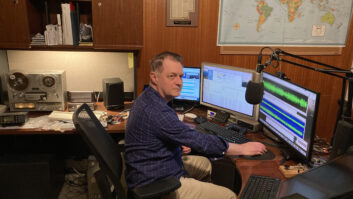WASHINGTON
Primosphere says it could be operational with a new U.S. satellite digital radio service in five years — and on the air much sooner if it were allowed to use the existing infrastructure of XM and Sirius.
Sirius officials scoffed at the proposal and said Primosphere’s application has been long dead.
Primosphere was an original applicant for S-DARS spectrum but lost in the auction for satellite licenses. Now as the industry debates the proposed merger of XM and Sirius, Primosphere wants to recast that debate and asked the FCC to review its ruling from a decade ago.
Observers believe what happens on this issue will be interesting regardless of whether the merger of Sirius and XM is approved.
Back in 1992, six companies applied for S-DARS spectrum licenses. By the time of the 1997 FCC auction, four remained: Satellite CD Radio, which became Sirius; American Mobile Satellite Radio Corp., which became XM; Primosphere Limited Partnership; and Digital Satellite broadcasting Corp. The latter two lost out to the bids of approximately $83.3 million from Satellite CD Radio and $90 million for AMRC.
Now Primosphere is telling the FCC that its bid for an S-DARS license remains viable.
The organization is a holding company for New York resident Clifford Burnstein and his partner Peter Mensch in the entertainment industry company Q-Prime; the latter is a music management group for such artists as Shania Twain, Nickel Creek, Red Hot Chili Peppers and Metallica. Their attorney, Howard Lieberman of Drinker Biddle & Reath, told Radio World the men own Primosphere, each holding half of the company.
In 1996 Burnstein and Mensch bid about $67.5 million for an SDARS license through Primosphere with the intention of restoring music genres they said were no longer available in major radio markets. According to their FCC filing from late 1992, Primosphere originally was proposing a free service; the owners are not commenting on what kind of service they would introduce now if they win their case, Lieberman said.
Years of requests, denials
After the commission dismissed Primosphere’s application as an unsuccessful bidder in 1997, the company asked that decision to be reviewed. The FCC’s International Bureau did so; it ruled that the companies which would become XM and Sirius qualified as licensees and it dismissed Primosphere’s application. The company then asked the bureau to reconsider and also asked the full commission to review the license grant decision, according to FCC filings.
In 2001, the agency denied Primosphere’s applications for review and affirmed the licenses granted to Sirius and XM. At the same time the International Bureau denied Primosphere’s request to reconsider its dismissal.
Primosphere next asked a federal appeals court to review the XM and Sirius license grants and also asked the full commission to review the bureau’s dismissal of its S-DARS application.
In 2003 the appeals court rejected Primosphere’s challenges and affirmed the licenses for Sirius and XM. In 2004, Primosphere told the FCC it wanted to withdraw its 2001 “review” request.
Now, Primosphere tells the commission that because the FCC failed to act on its request, the application for an S-DARS license is still pending and it wants its application to be considered at the same time the commission is reviewing the merger application from XM and Sirius.
Re-auction
The company also wants the commission to authorize a portion of the S-DARS spectrum to Primosphere if the agency approves the XM/Sirius merger, pointing out the FCC originally stated in 1997, “[I]f the winning bidder fails to submit the balance of the winning bid or the license is otherwise denied, we will assess a default payment … and re-auction the license among the other existing applicants.”
Primosphere says because its review application is still pending, it remains an “existing applicant for authorization to launch and operate” a satellite digital radio service.
If it receives the S-band spectrum, the company says it will build and launch “its own satellites and market its own service.” The company notes that in 1996, along with its original bid, it also paid $140 million in launch fees for the two satellites it proposed in its original application — funds the FCC still has, Lieberman said.
The company estimates it would take five years to be operational. However, it would like to be up and running sooner. It proposes that the commission allow it to use a portion of the S-DARS spectrum now used by XM and Sirius and require the merged satcasters to allow Primosphere to use their satellite systems to deliver Primosphere programming to its subscribers.
Primosphere cited a similar agreement the agency approved in 1999 for a satellite TV provider to lease to another provider transponder capacity on an existing satellite.
NPR, without specific reference to Primosphere, has argued in its own comments to the FCC that if regulators do approve a merger, they should also require that a “sufficient” amount of the S-band spectrum licenses occupied by the satellite companies be vacated to make room for another competitor.
Sirius, meanwhile, in a July response, called Primosphere’s motion the “latest gambit in an attempt to breathe new life into its long-dead application for satellite radio service and profit from the proposed XM/Sirius merger.”
Sirius argues that Primosphere’s application to hold an S-DARS license became moot when it lost the auction bidding. When Primosphere “voluntarily” withdrew its application, that retraction became effective without any action from the FCC, according to Sirius.
Primosphere’s application was only “pending” as long as challenges to the XM and Sirius licenses were unresolved; those challenges were resolved long ago, Sirius stated in its recent FCC filing. “There is now way for Primosphere to un-ring this bell” now, it stated.
It was difficult in August to foresee the likely outcome of the case. No other filings on this topic had been filed with the commission at press time, and attorneys contacted by RW for comment said they were unfamiliar with the case.
Leiberman said typically the FCC addresses many unresolved issues related to a topic when the agency releases a rulemaking or an order, and his clients hope the Primosphere request would be answered when the satellite radio merger review is completed.
Asked for comment, NAB spokesman Dennis Wharton said, “NAB takes no position on the merits of the Primosphere claims, but their interest once again shows that it would be bad public policy to have a monopoly entity control all the spectrum allocated to satellite radio service.”
XM did not respond to a query for comment.












